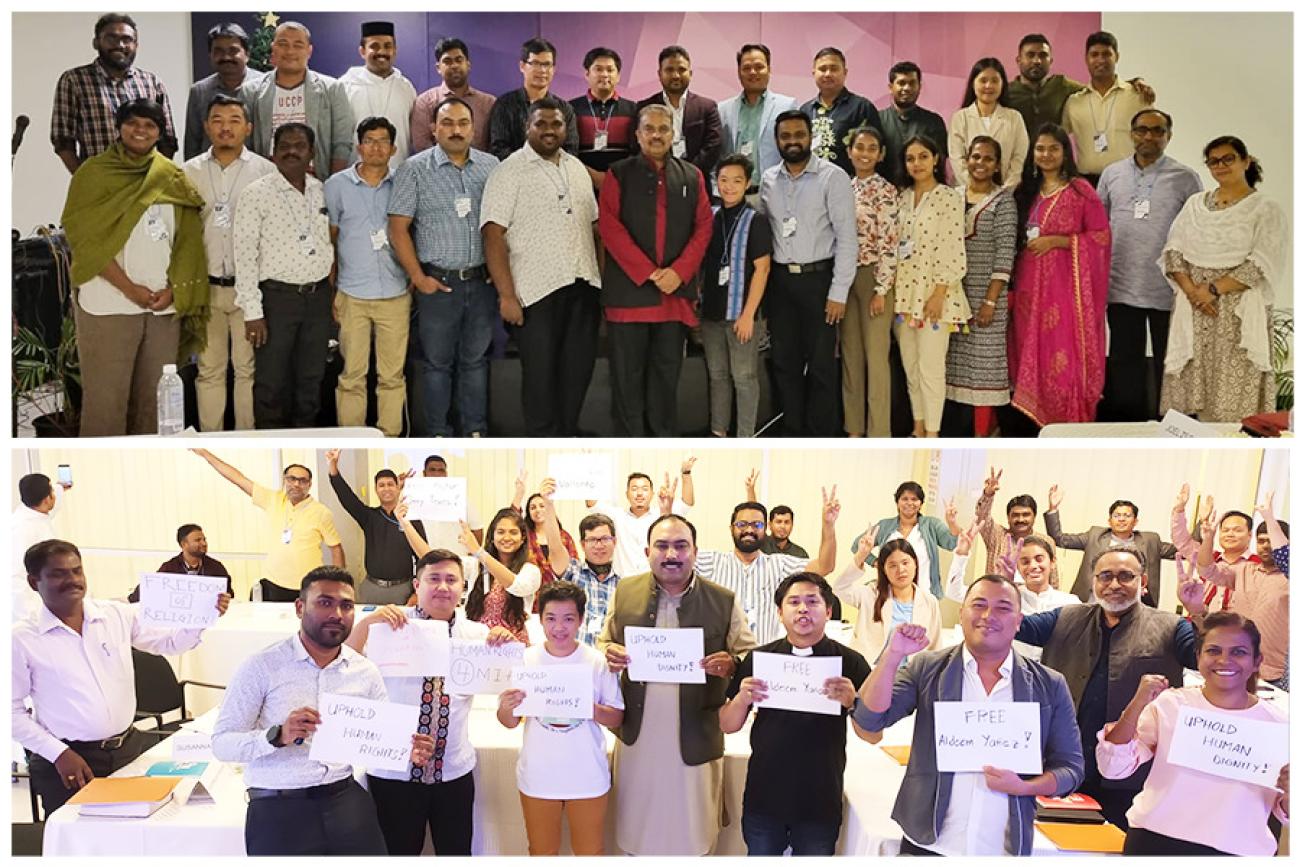CCA’s Institute on Human Rights trains church workers with focus on human dignity and human rights

Participants of Institute on Human Rights–2022
Colombo, Sri Lanka: The Christian Conference of Asia (CCA) organised a week-long Institute on Human Rights, an intensive training programme with a focus on ‘Affirming Human Dignity for Upholding Human Rights in Asia’, from 4 to 11 December 2022 in Colombo, Sri Lanka.
The training programme was held at the headquarters of the Methodist Church in Sri Lanka in Colombo, Sri Lanka.
Twenty-seven young church workers and pastors, specially selected from the CCA’s member churches from ten Asian countries, attended the programme.
Renowned human rights defenders, activists, academicians, as well as Christian social ethicists were the resource persons for the training.
Dr Mathews George Chunakara, the CCA General Secretary led three sessions on ‘Human Rights and Human Dignity in Tradition and Modernity’, ‘Human Dignity: The Guiding Principle of Human Rights’, and ‘Human Rights Advocacy in the Ecumenical Agenda’.
In the first two sessions led by Dr Mathews George Chunakara, the participants received detailed and comprehensive historical analysis and evolution of the fundamental ideas and principles related to human dignity and human rights, and their emergence in different contexts—eastern and western, religious and secular. The third session expounded on the various involvements and initiatives that sprung within the ecumenical movement to campaign for human dignity and human rights issues around the world.
The sessions on ‘Human Dignity and Human Rights: Biblical Perspectives’ and ‘Human Dignity and Human Rights: Theological Perspectives’ were addressed by Bishop Dr Daniel Thiagarajah, from the Jaffna Diocese of the Church of South India in Sri Lanka. Bishop Thiagarajah challenged pre-existing notions that the participants held and proposed new ways of conceptualising human rights and human dignity from the faith perspective.
His inspiring presentation on ‘Being the Church that Promotes and Defends Human Rights’ on 10th December, World Human Rights Day, was the concluding presentation. He called upon the young people present to examine and live out their Christian vocation of love and service towards the most marginalised and disenfranchised.
Basil Fernando, from the Asian Human Rights Commission in Hong Kong, led the sessions on ‘Rule of Law and Human Rights in Asia’ and ‘Human Rights and the Role of Judiciary in Protecting Human Rights’. Through these sessions, the veteran human rights activist from Sri Lanka also highlighted the attempts to undermine the independence of different judiciaries and shared information on the court processes of human rights laws and cases.
Well-known Indian academician, Prof. Dr Faizan Mustafa from Aligarh Muslim University in India, covered issues related to ‘Right to Freedom of Religion and Belief and Human Rights in Asia’ and ‘Right to Freedom of Expression in an Age of Misinformation and Hate Speech’. Prof. Mustafa touched upon the complex and overlapping rights of freedom of religion and belief as well as freedom of expression in an increasingly polarised world, characterised by the heightened presence of religio-nationalistic and ethno-nationalistic political groups in many Asian countries.
In a session focusing on ‘The United Nations and Human Rights Advocacy’, Jennifer Philpot-Nissen from the World Council of Churches in Geneva, Switzerland, took the participants through the different United Nations review mechanisms such as the Universal Periodic Review, different treaty bodies, and special procedure mechanisms, and shared concrete steps and pathways that the participants could take to raise and amplify local human rights issues at the global level.
Pia Oberoi, a Senior Advisor at the OHCHR Asia Pacific Office in Bangkok, delivered a presentation on ‘The Human Rights of Migrants, Refugees, and Stateless People’, which was a reality being faced by many of the participants’ home communities. Ms Oberoi’s session covered legal human rights sources and areas of international law relevant to migration and mobility, the human rights obligations of states, the right to due process, and the Global Compact on Safe and Orderly Migration.
Ruki Fernando, a human rights defender, led the session on ‘The International Bill of Human Rights’, and Mangala Shankar, a senior lawyer, led the session on ‘The Convention on the Elimination of All Forms of Discrimination Against Women’, both of which were foundational sessions for the training course. The two Sri Lankan leaders who have decades of experience in human rights advocacy and defence comprehensively shared the evolution of key human rights documents, their specific articles, and their application in today’s societies.
Marisa de Silva and Devinda Kodagoda, civil society leaders of the 2022 Sri Lanka’s ‘Aragalaya’ protest movement, spoke about ‘Improving the Effectiveness of Civil Society in Protection of Human Rights’. The two activists shared their deeply personal experiences of being part of the Galle Face protest movement in Colombo against rampant corruption and the twin political-financial crises. They candidly shared the movement’s successes and shortcomings as well as lessons for other civil society movements in Asia.
All sessions included opportunities for exploration and dialogue between the speakers and the participants.
Bible studies led by Rev. Dr Abraham Mathew of the National Council of Churches in India and John Paul Devakumar from the CCA provided in-depth Christian social ethical perspectives on human rights and human dignity.
Each day of the training ended with experiential workshops and activities that recapitulated and summarised the learnings of the day as well as explored applications of the topics that were discussed. The workshop sessions were facilitated by Ruth Mathen and John Paul Devakumar of CCA.










